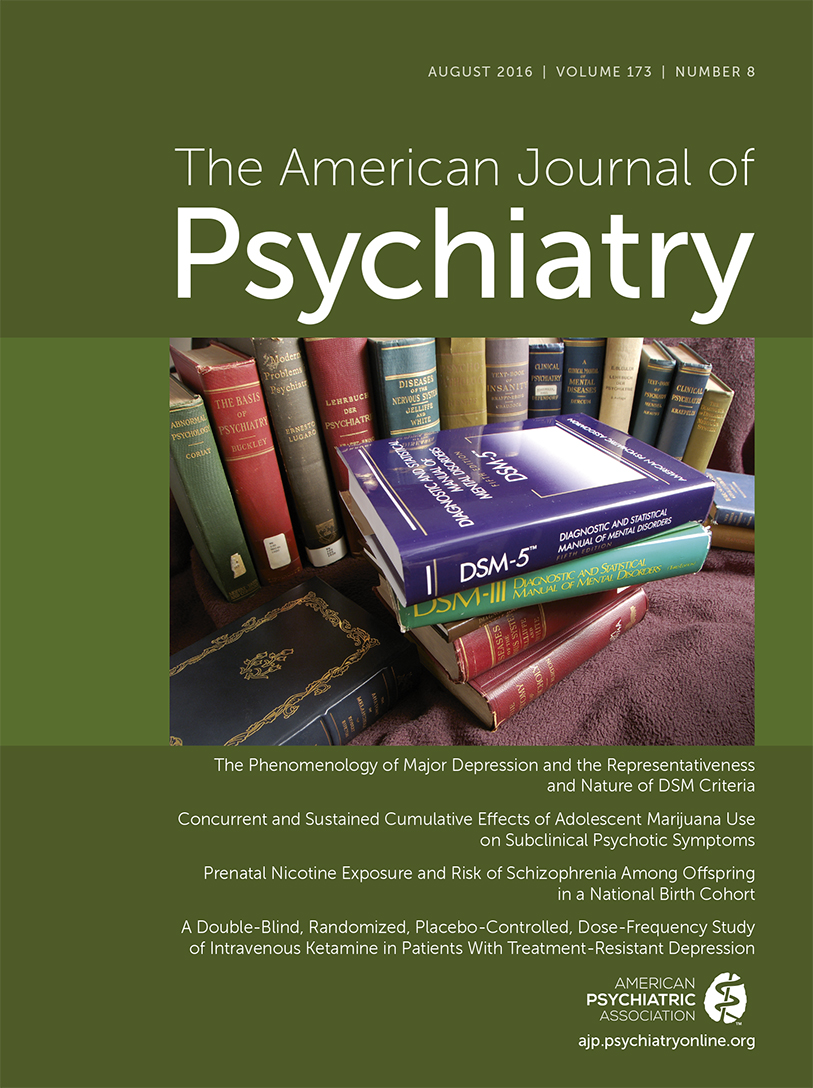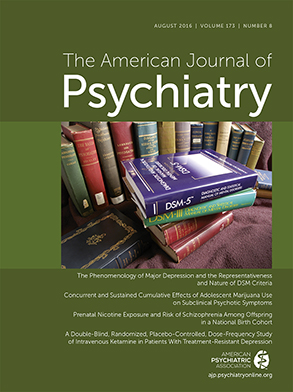The use of tobacco is associated with an increased risk of a wide range of disorders. Put bluntly, smoking is bad for your health. With respect to schizophrenia, it has long been known that patients are more likely to smoke compared with the general community (
1) and that as a consequence, they have premature mortality from tobacco-related disorders (
2). For example, a study based on comprehensive Nordic registers (Denmark, Sweden, and Finland) has shown that mortality from diseases of the circulatory system that are strongly linked with smoking are much more common in those with schizophrenia compared with the general Nordic population (
3). With so much convincing data, it is hard to imagine that we need any additional evidence to convince us that smoking is bad for your health. However, in recent years epidemiologists have pinned new crimes on the tobacco “charge sheet.” This is like a detective story where the culprit is revealed in Act 1, but we are still uncovering the nature of the criminal activity in Act 3.
It has recently emerged that the relationship between smoking and schizophrenia may be bidirectional. Not only do people with schizophrenia have an increased risk of subsequent tobacco dependence, but smoking may slightly increase the risk of subsequent schizophrenia. Weiser and colleagues (
4) followed up 14,248 adolescents and found that those who used tobacco had a twofold increased risk of the subsequent onset of schizophrenia (odds ratio=1.94, 95% confidence interval=1.05–3.58). Longitudinal birth cohort studies have also noted that smoking is associated with an increased risk of later psychotic experiences (
5,
6). Kendler and colleagues (
7) confirmed that the use of tobacco was associated with an increased risk of later schizophrenia and undertook an impressive range of additional analyses to lend weight to the finding. For example, they reported that 1) those who used more tobacco had a greater risk of subsequent psychosis compared with those with light smoking, 2) those who stopped smoking (within a subset of pregnant women) subsequently had a lower risk of later psychosis (compared with those who continued to smoke during their pregnancy), and 3) within relative pairs, the relative who smoked had a greater risk of subsequent psychosis compared with the relative who did not smoke (a design that reduces the influence of possible familial factors that may have confounded the analyses). Within the constraints of observational epidemiology (i.e., we cannot be certain about the causal pathways), this type of evidence is persuasive. Overall, these studies lend considerable weight to the hypothesis that smoking is a causal risk factor for schizophrenia. We do not have many modifiable candidate risk factors for schizophrenia, so the identification of smoking as a potential modifiable risk factor is important for the field.
Following the evidence trail further back, we also find tantalizing clues from genetics (
8). Genome-wide association studies for schizophrenia have implicated risk alleles near the genes for nicotinic receptors—these same risk alleles are linked to smoking and smoking-related adverse health outcomes. If smoking is a risk-modifying factor for schizophrenia, then we would expect that common genetic variants that are causally linked to smoking will be blindly harvested in genome-wide association studies for schizophrenia.
Could prenatal exposure to tobacco (i.e., maternal smoking) also affect the risk of schizophrenia in the offspring? Do we have a “smoking gun” here also? Curiously, Benros and colleagues (
9) reported that maternal (small-cell) lung cancer during pregnancy was associated with an increased risk of schizophrenia in the offspring. As small-cell lung cancer is 1) strongly linked to smoking and 2) can induce the production of antibodies that can cross the placenta and impact the CNS, this study suggests a possible link between maternal smoking and risk of schizophrenia in the offspring. However, an impressive study from Niemelä and colleagues in this issue (
10) has discovered another interesting clue. Based on a Finnish birth cohort, the offspring of mothers with higher serum cotinine concentrations (a marker of tobacco use) were more likely to develop schizophrenia. This association persisted when a range of adjustments were included in the statistical models. It has long been known that the offspring of pregnant women who smoke are at increased risk for a wide range of adverse neonatal outcomes. The new study suggests that prenatal exposure to nicotine (and/or other tobacco-related compounds) may have an impact on brain development, which in turn may increase the risk of later schizophrenia.
So, in the spirit of crime dramas, do we have enough evidence to make a conviction? With respect to individuals with schizophrenia, the evidence linking smoking and premature mortality in this group is “beyond reasonable doubt.” With respect to the evidence that smoking may cause schizophrenia, the evidence continues to accumulate. This evidence does not meet the criteria for “beyond reasonable doubt,” but it may soon meet the “preponderance of evidence” criteria. Regardless of the weight of this new evidence, the public health response is clear. Smoking in bad for your health, and pregnant women who smoke put their children’s health at risk also.

